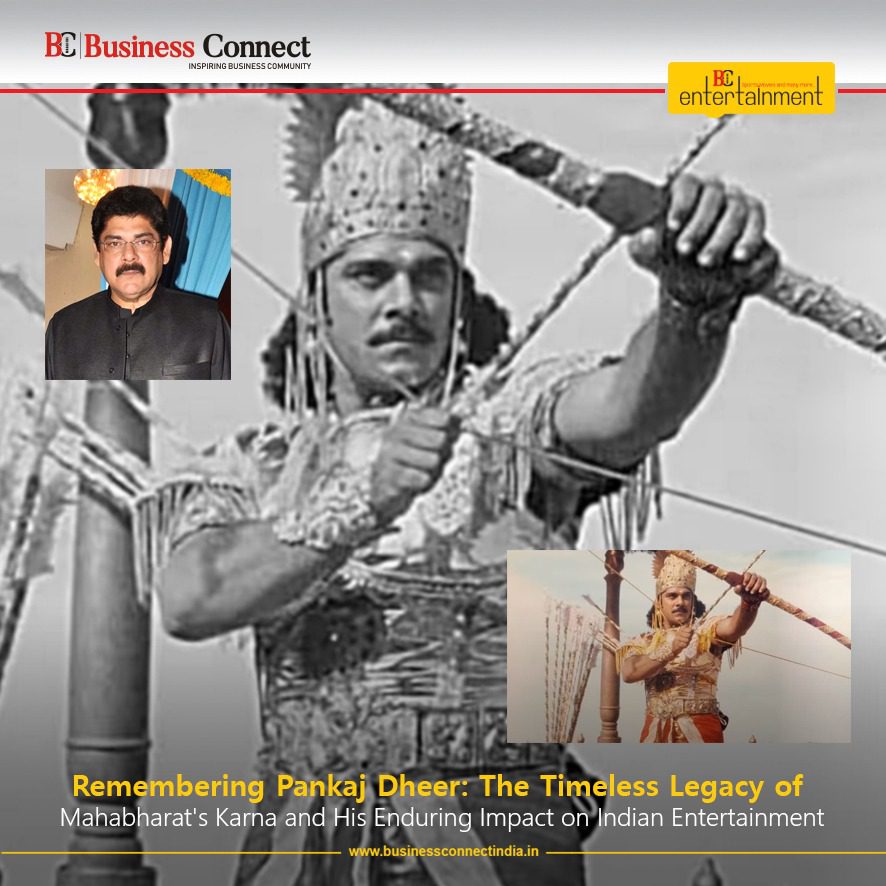The Legacy of Pankaj Dheer: Mahabharat’s Karna and His Lasting Influence on Indian TV
At a melancholic moment for Indian television and cinema, veteran actor Pankaj Dheer, forever etched in the hearts of millions as the courageous Angraj Karna of B.R. Chopra’s seminal Mahabharat, passed away today at the age of 68 after a long struggle with cancer. The news, as accepted by the Cine and TV Artistes’ Association (CINTAA), has created shock waves of sorrow throughout the industry and among fans who were brought up worshipping his rendering of the tragic warrior prince.
As condolences flood in from social media and more, Dheer’s passing is a powerful reminder of the deep impact of storytelling in bridging generations—a fundamental principle of the entertainment industry that Business Connect Magazine has always stood for.
Born on February 4, 1957, in Delhi, Pankaj Dheer initially set foot in the world of theater before moving to the silver and small screen, where he properly discovered his rhythm. His big hit was in 1988 with Mahabharat, the pioneering Doordarshan epic that revolutionized mythological epics for the modern masses.
Directed by B.R. Chopra and produced with painstaking detail to cultural accuracy, the show was a cultural sensation, commanding viewership figures that compare with today’s streaming behemoths. Dheer’s Karna was more than a character; he was the very archetype of the forgotten hero—ferocious, devoted, and wrenchingly noble—reflecting the multifaceted nature of man’s ambition and destiny that still inspires creators to this day.
Television as an industry during the late 1980s and 1990s was in its infancy but revolutionary, with Mahabharat being the trailblazer of the serialized drama that encouraged viewing habits for families and increased Doordarshan’s advertising revenues. Dheer’s job not only launched him to fame but also brought into focus the economic prospects of culturally engaging content.
According to industry estimates during that time, the series raked in millions of revenue from ancillary sources in the form of merchandise and reruns, setting the stage for the multi-billion-dollar Indian television industry we have today. His work was met with universal appreciation, such as fan mail that swamped production studios, highlighting the actor-observer connection that fuels business success in entertainment.
Outside of Mahabharat, Dheer’s range was evident in a varied resume that crossed television and cinema, highlighting his versatility in a constantly changing business. He depicted the mysterious King Shivdutt in the fantasy epic Chandrakanta (1994), a part that mixed adventure with royal politics and became an evening staple. His work as mentor Barrister Karan to K.D. Pathak in Adalat showed his strength in legal shows, a space that has since boomed into procedural successes on OTT.
Dheer also stepped into Bollywood with iconic supporting roles in movies such as Sadak (1991), Baazigar (1993), Soldier (1998), and Tumko Na Bhool Paayenge (2002), usually ending up as authoritative figures which provided balance to ensemble casts. More recently, he appeared in the web series Poison (2019) and his final TV outing in Dhruv Tara – Samay Sadi Se Pare (2024), proving his relevance in the digital shift that has transformed content consumption and monetization strategies.
Dheer’s off-screen contributions to the business of showbiz were equally significant. As a former Honorary General Secretary of CINTAA and Chairman of its Trust, he fought for the welfare of artistes, securing improved contracts and health coverage at a period when the industry faced problems of labor.
His work professionalized guilds, ensuring stable careers in the midst of the boom of private channels in the 1990s. This tradition of activism is one with Business Connect Magazine’s purpose of highlighting leaders establishing strong ecosystems in innovative industries.
Survived by his wife, Anita Dheer, and son Nikitin Dheer—a veteran actor starring in Chennai Express and Jodhaa Akbar—Pankaj is survived by a family empire in entertainment. Nikitin, who frequently discussed his father’s impact on his work, is the embodiment of intergenerational talent transfer that drives Bollywood’s family businesses. As condolences pour onto platforms such as X (formerly Twitter), where users post clips of Karna’s legendary dialogues and personal stories, the overflow attests to Dheer’s business success: crafting characters that move beyond screens and accumulate long-term cultural capital.
Pankaj Dheer’s fight with cancer, which recurred after extensive surgery this year, was waged with the same dignity he brought to his characters. His cremation is to take place at 4:30 PM today at Pawan Hans, Vile Parle (West), Mumbai, where industry friends and admirers will pay their last respects. In an industry frequently faulted for its transient success, Dheer’s career is one of lasting worth—evidence that true stories pay off in multiples over box office success.
As we bid farewell to a giant, let us pay tribute to how Pankaj Dheer bridged myths and modernity, and inspired not only actors but an entire generation of producers, directors, and audiences. His Karna will always remind us: real heroes are the ones who defy all odds, leaving behind a legacy that business and art can hope to emulate.
Rest in peace, Pankaj ji. Om Shanti.
Add Business Connect magazine to your Google News feed
Must Read:-
- Larry Ellison of Oracle Suddenly Overtakes Elon Musk as the Richest Person in the World
- Top 10 Richest Comedians In India
- Top 10 Richest Pakistani Actress in 2025 – Who Is Your Favorite?
- Majhi Ladki Bahin Yojana 2025: Benefits, Registration & KYC Guide
- Discover What Sets the Best Global Business Magazines Apart for Entrepreneurs



